2021-2022学年人教版(2019)必修一:Unit1 Teenage life 提升练习(含答案)
文档属性
| 名称 | 2021-2022学年人教版(2019)必修一:Unit1 Teenage life 提升练习(含答案) |
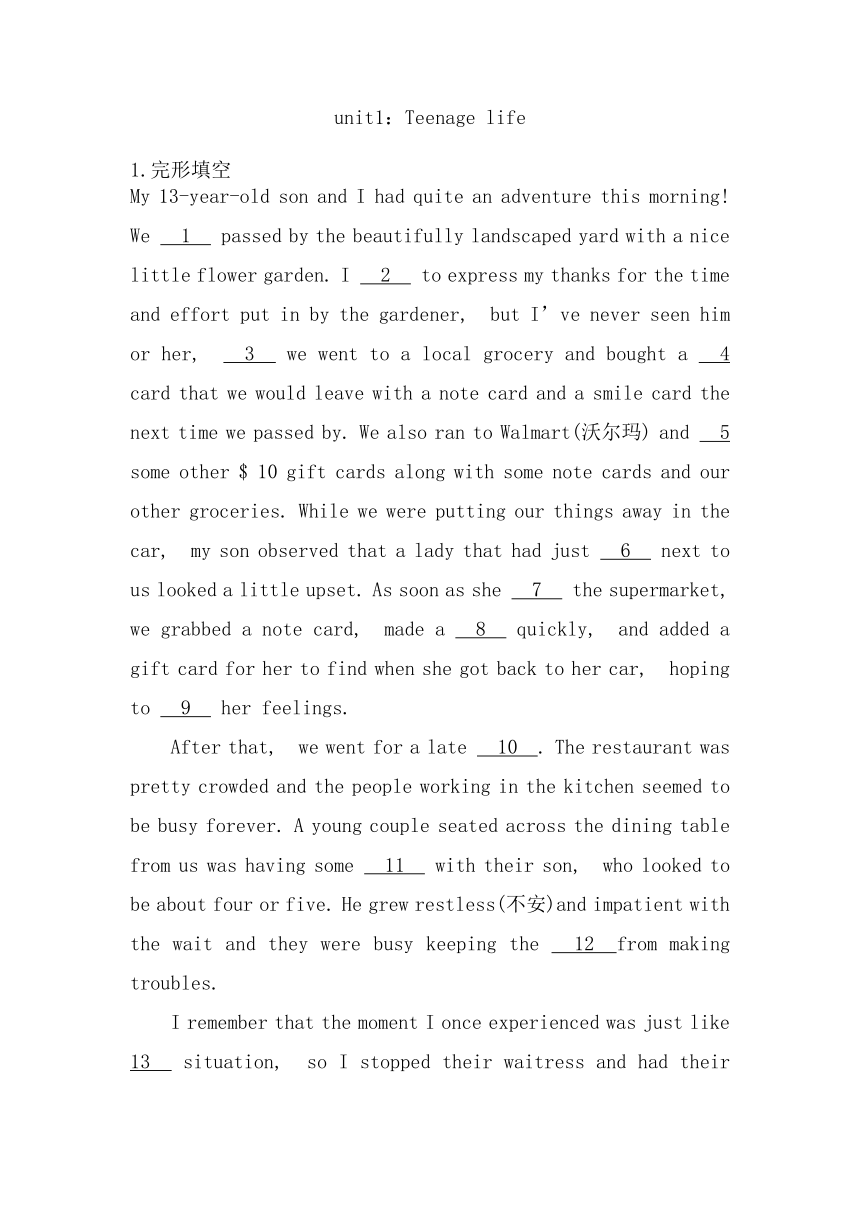
|
|
| 格式 | docx | ||
| 文件大小 | 34.7KB | ||
| 资源类型 | 教案 | ||
| 版本资源 | 人教版(2019) | ||
| 科目 | 英语 | ||
| 更新时间 | 2021-09-04 00:00:00 | ||
图片预览

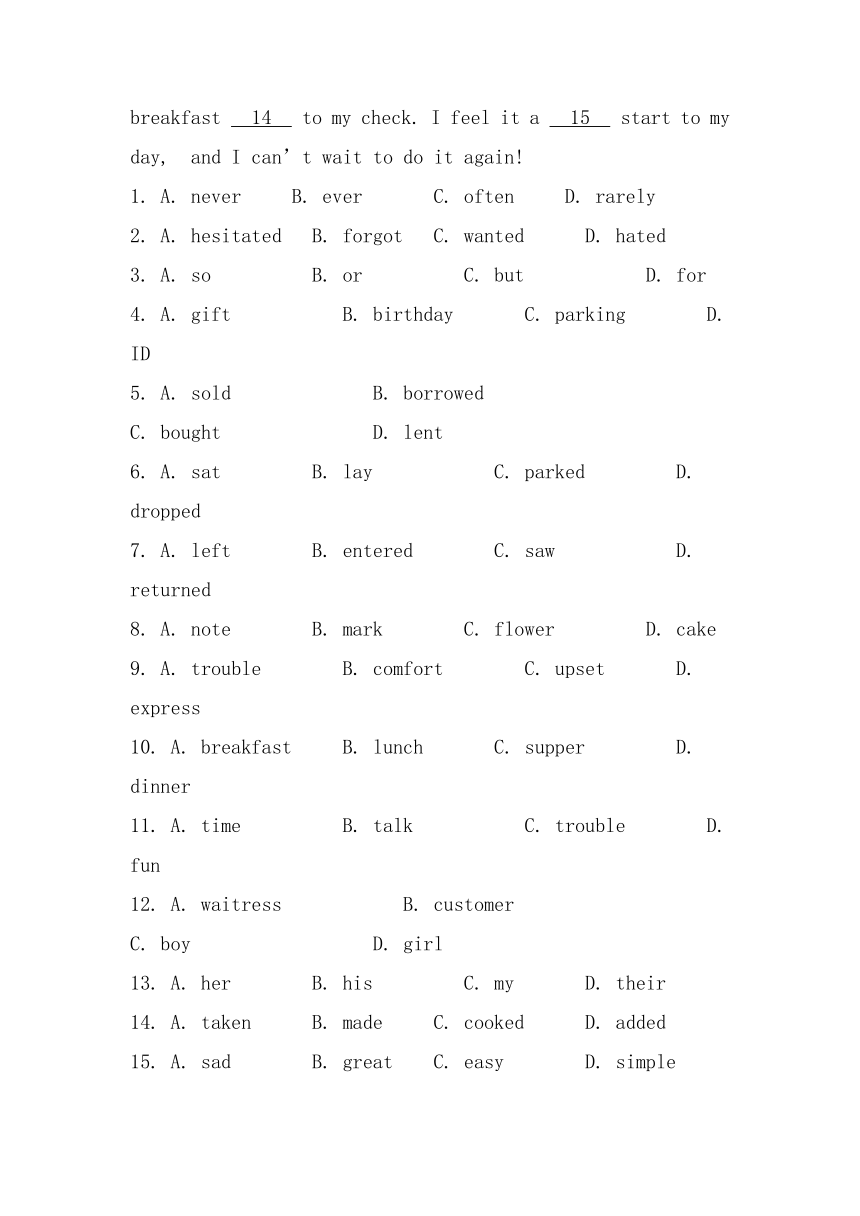
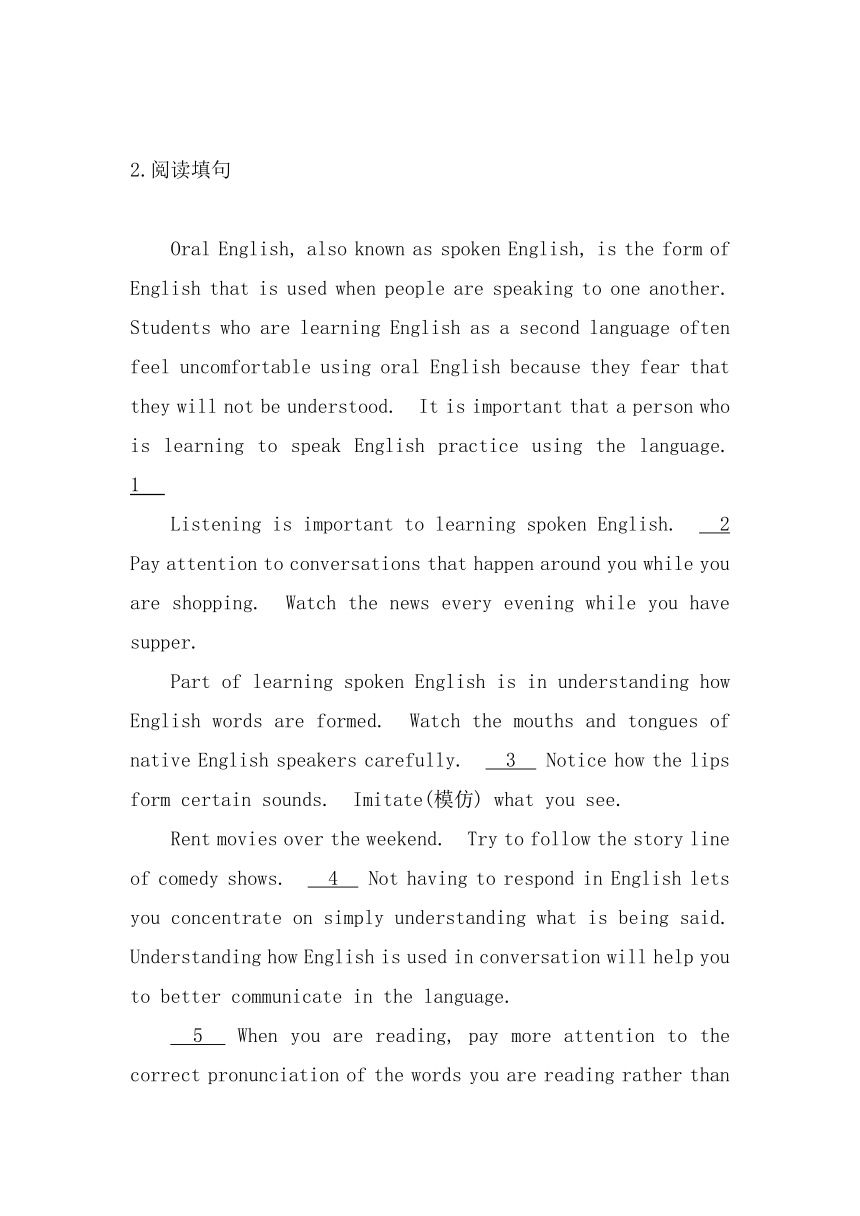
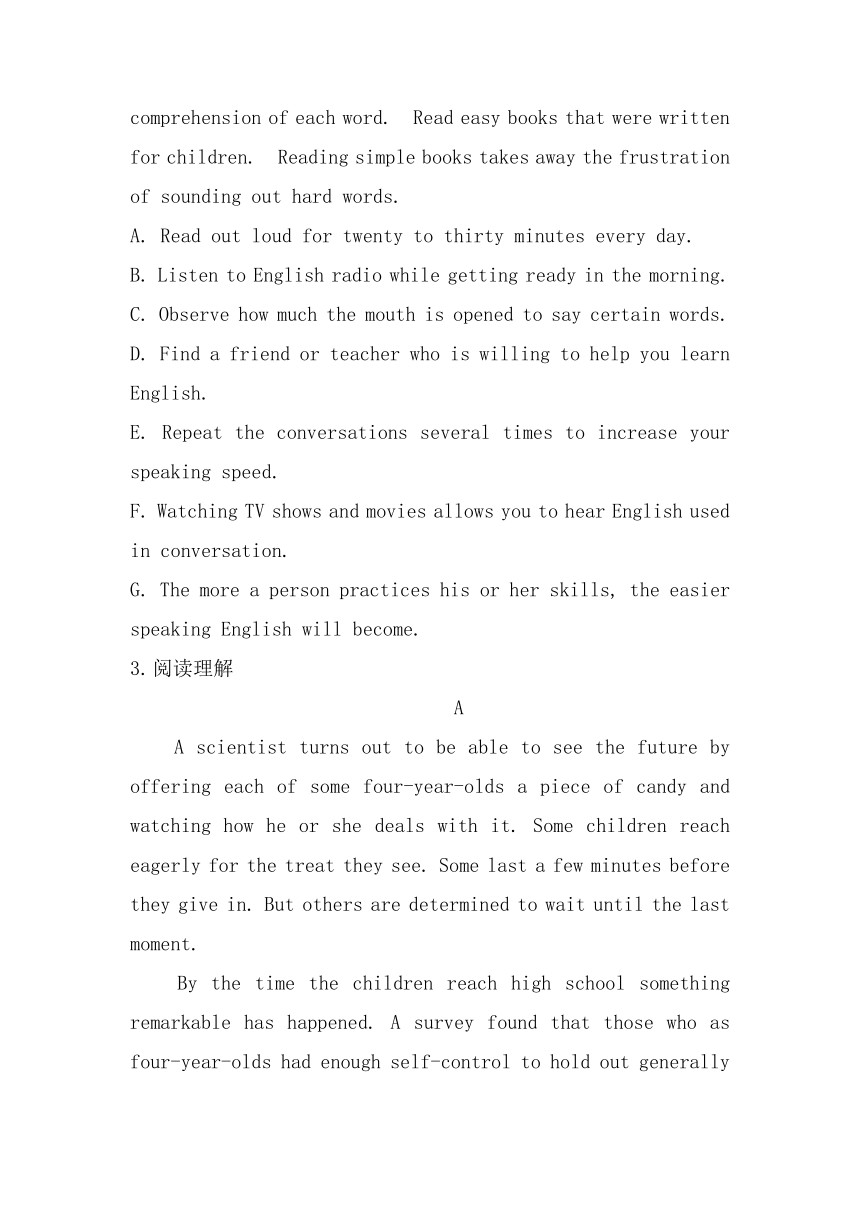
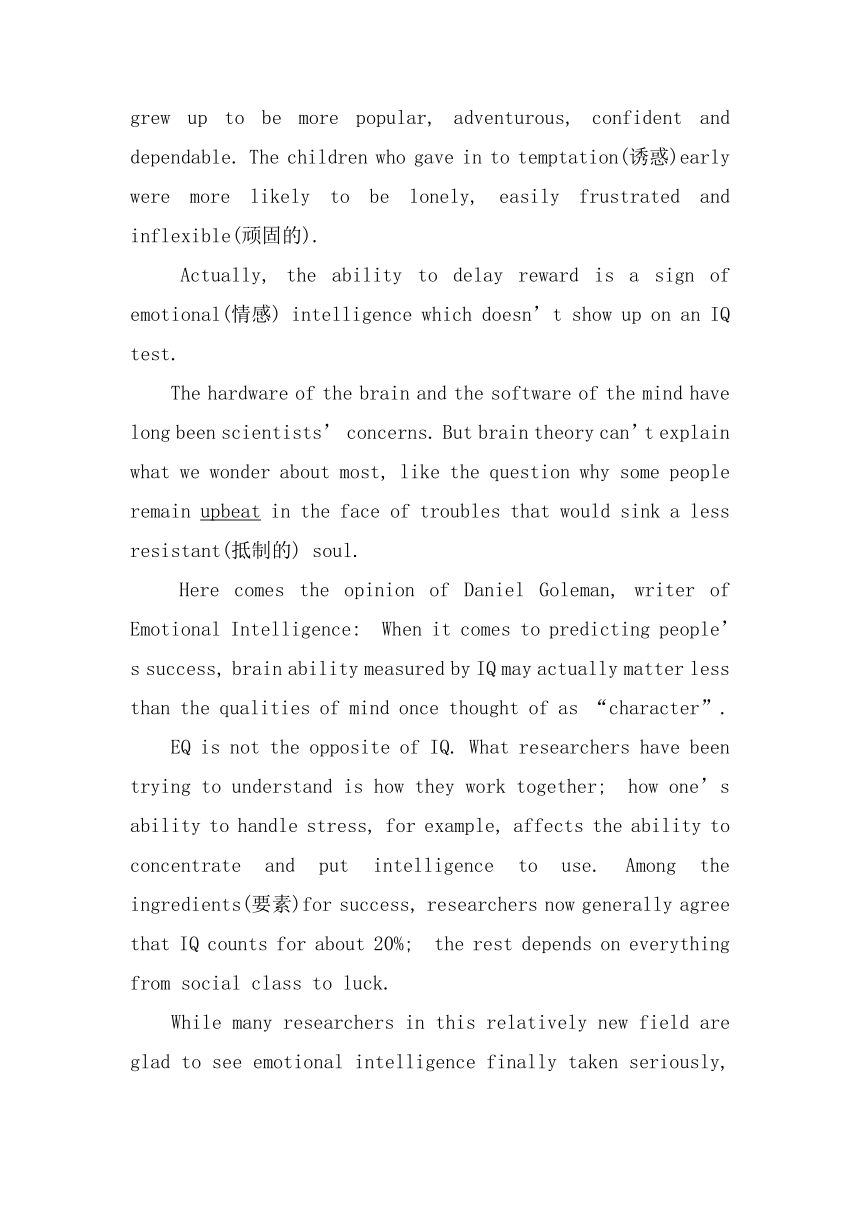
文档简介
unit1:Teenage
life
1.完形填空
My
13-year-old
son
and
I
had
quite
an
adventure
this
morning!
We
1
passed
by
the
beautifully
landscaped
yard
with
a
nice
little
flower
garden.
I
2
to
express
my
thanks
for
the
time
and
effort
put
in
by
the
gardener,
but
I’ve
never
seen
him
or
her,
3
we
went
to
a
local
grocery
and
bought
a
4 card
that
we
would
leave
with
a
note
card
and
a
smile
card
the
next
time
we
passed
by.
We
also
ran
to
Walmart(沃尔玛)
and
5
some
other
$
10
gift
cards
along
with
some
note
cards
and
our
other
groceries.
While
we
were
putting
our
things
away
in
the
car,
my
son
observed
that
a
lady
that
had
just
6
next
to
us
looked
a
little
upset.
As
soon
as
she
7
the
supermarket,
we
grabbed
a
note
card,
made
a
8
quickly,
and
added
a
gift
card
for
her
to
find
when
she
got
back
to
her
car,
hoping
to
9
her
feelings.
?
After
that,
we
went
for
a
late
10 .
The
restaurant
was
pretty
crowded
and
the
people
working
in
the
kitchen
seemed
to
be
busy
forever.
A
young
couple
seated
across
the
dining
table
from
us
was
having
some
11
with
their
son,
who
looked
to
be
about
four
or
five.
He
grew
restless(不安)and
impatient
with
the
wait
and
they
were
busy
keeping
the
12 from
making
troubles.
?
I
remember
that
the
moment
I
once
experienced
was
just
like
13
situation,
so
I
stopped
their
waitress
and
had
their
breakfast
14
to
my
check.
I
feel
it
a
15
start
to
my
day,
and
I
can’t
wait
to
do
it
again!
1.
A.
never
B.
ever
C.
often
D.
rarely
2.
A.
hesitated
B.
forgot
C.
wanted
D.
hated
3.
A.
so
B.
or
C.
but
D.
for
4.
A.
gift
B.
birthday
C.
parking
D.
ID
5.
A.
sold
B.
borrowed
C.
bought
D.
lent
6.
A.
sat
B.
lay
C.
parked
D.
dropped
7.
A.
left
B.
entered
C.
saw
D.
returned
8.
A.
note
B.
mark
C.
flower
D.
cake
9.
A.
trouble
B.
comfort
C.
upset
D.
express
10.
A.
breakfast
B.
lunch
C.
supper
D.
dinner
11.
A.
time
B.
talk
C.
trouble
D.
fun
12.
A.
waitress
B.
customer
C.
boy
D.
girl
13.
A.
her
B.
his
C.
my
D.
their
14.
A.
taken
B.
made
C.
cooked
D.
added
15.
A.
sad
B.
great
C.
easy
D.
simple
2.阅读填句
Oral
English,
also
known
as
spoken
English,
is
the
form
of
English
that
is
used
when
people
are
speaking
to
one
another.
Students
who
are
learning
English
as
a
second
language
often
feel
uncomfortable
using
oral
English
because
they
fear
that
they
will
not
be
understood.
It
is
important
that
a
person
who
is
learning
to
speak
English
practice
using
the
language.
1 ?
Listening
is
important
to
learning
spoken
English.
2
Pay
attention
to
conversations
that
happen
around
you
while
you
are
shopping.
Watch
the
news
every
evening
while
you
have
supper.
?
Part
of
learning
spoken
English
is
in
understanding
how
English
words
are
formed.
Watch
the
mouths
and
tongues
of
native
English
speakers
carefully.
3
Notice
how
the
lips
form
certain
sounds.
Imitate(模仿)
what
you
see.
?
Rent
movies
over
the
weekend.
Try
to
follow
the
story
line
of
comedy
shows.
4
Not
having
to
respond
in
English
lets
you
concentrate
on
simply
understanding
what
is
being
said.
Understanding
how
English
is
used
in
conversation
will
help
you
to
better
communicate
in
the
language.
?
5
When
you
are
reading,
pay
more
attention
to
the
correct
pronunciation
of
the
words
you
are
reading
rather
than
comprehension
of
each
word.
Read
easy
books
that
were
written
for
children.
Reading
simple
books
takes
away
the
frustration
of
sounding
out
hard
words.
?
A.
Read
out
loud
for
twenty
to
thirty
minutes
every
day.
B.
Listen
to
English
radio
while
getting
ready
in
the
morning.
C.
Observe
how
much
the
mouth
is
opened
to
say
certain
words.
D.
Find
a
friend
or
teacher
who
is
willing
to
help
you
learn
English.
E.
Repeat
the
conversations
several
times
to
increase
your
speaking
speed.
F.
Watching
TV
shows
and
movies
allows
you
to
hear
English
used
in
conversation.
G.
The
more
a
person
practices
his
or
her
skills,
the
easier
speaking
English
will
become.
阅读理解
A
A
scientist
turns
out
to
be
able
to
see
the
future
by
offering
each
of
some
four-year-olds
a
piece
of
candy
and
watching
how
he
or
she
deals
with
it.
Some
children
reach
eagerly
for
the
treat
they
see.
Some
last
a
few
minutes
before
they
give
in.
But
others
are
determined
to
wait
until
the
last
moment.
By
the
time
the
children
reach
high
school
something
remarkable
has
happened.
A
survey
found
that
those
who
as
four-year-olds
had
enough
self-control
to
hold
out
generally
grew
up
to
be
more
popular,
adventurous,
confident
and
dependable.
The
children
who
gave
in
to
temptation(诱惑)early
were
more
likely
to
be
lonely,
easily
frustrated
and
inflexible(顽固的).
Actually,
the
ability
to
delay
reward
is
a
sign
of
emotional(情感)
intelligence
which
doesn’t
show
up
on
an
IQ
test.
The
hardware
of
the
brain
and
the
software
of
the
mind
have
long
been
scientists’
concerns.
But
brain
theory
can’t
explain
what
we
wonder
about
most,
like
the
question
why
some
people
remain
upbeat
in
the
face
of
troubles
that
would
sink
a
less
resistant(抵制的)
soul.
Here
comes
the
opinion
of
Daniel
Goleman,
writer
of
Emotional
Intelligence:
When
it
comes
to
predicting
people’s
success,
brain
ability
measured
by
IQ
may
actually
matter
less
than
the
qualities
of
mind
once
thought
of
as
“character”.
EQ
is
not
the
opposite
of
IQ.
What
researchers
have
been
trying
to
understand
is
how
they
work
together;
how
one’s
ability
to
handle
stress,
for
example,
affects
the
ability
to
concentrate
and
put
intelligence
to
use.
Among
the
ingredients(要素)for
success,
researchers
now
generally
agree
that
IQ
counts
for
about
20%;
the
rest
depends
on
everything
from
social
class
to
luck.
While
many
researchers
in
this
relatively
new
field
are
glad
to
see
emotional
intelligence
finally
taken
seriously,
some
few
fear
EQ
causes
misuse.
1.
The
experiment
with
the
four-year-olds
makes
it
clear
that______.
?
A.
the
age
of
4
is
a
good
time
for
scientific
experiments
B.
emotional
intelligence
won’t
show
up
until
adulthood
C.
the
ability
of
self-control
plays
a
role
in
personal
success
D.
candy
can
be
used
to
measure
a
person’s
emotional
intelligence
2.
Which
of
the
following
is
true
of
EQ
and
IQ
according
to
the
text?
A.
The
higher
a
person’s
EQ
is,
the
higher
his
or
her
IQ
is.
B.
The
higher
a
person’s
IQ
is,
the
higher
his
or
her
EQ
is.
C.
Some
people
can
be
blessed
with
lots
of
both,
but
some
with
little
of
either.
D.
Scientists
are
trying
to
discover
the
way
in
which
EQ
and
IQ
work
together.
3.
The
underlined
word“upbeat”in
Paragraph
4
probably
means
“______”.
?
A.
kind
B.
floating
C.
excited
D.
optimistic(乐观的)
4.
What
is
most
likely
to
be
written
in
the
paragraph
that
follows?
A.
Information
about
famous
people
with
high
EQ.
B.
Examples
showing
the
bad
voice
about
EQ.
C.
Some
reasons
why
EQ
is
a
relatively
new
field.
D.
Strong
demands
for
basic
emotional
education.
B
Too
many
people
want
others
to
be
their
friends,
but
they
don’t
give
friendship
back.
That
is
why
some
friendships
don’t
last
very
long.
To
have
a
friend,
you
must
learn
to
treat
your
friend
the
way
you
want
your
friend
to
treat
you.
Learning
to
be
a
good
friend
means
learning
three
rules:
be
honest;
be
generous(宽宏大量的);
be
understanding.
Honesty
is
where
a
good
friendship
starts.
Friends
must
be
able
to
trust
one
another.
If
you
do
not
tell
the
truth,
people
usually
find
out.
If
a
friend
finds
out
that
you
haven’t
been
honest,
you
may
lose
your
friend’s
trust.
Good
friends
always
rely
on
one
another
to
speak
and
act
honestly.
Generosity
means
sharing
and
sharing
makes
a
friendship
grow.
You
do
not
have
to
give
your
lunch
money
or
your
clothes.
Naturally
you
will
want
to
share
your
ideas
and
feelings.
These
can
be
very
valuable
to
a
friend.
They
tell
your
friend
what
is
important
to
you.
By
sharing
them,
you
help
your
friend
know
better.
Sooner
or
later
everyone
needs
understanding
and
help
with
a
problem.
Something
may
go
wrong
at
school.
Talking
about
the
problem
can
make
it
easier
to
solve.
Turning
to
a
friend
can
be
a
first
step
in
solving
the
problem.
So
to
be
a
friend
you
must
listen
and
understand.
You
must
try
to
put
yourself
in
your
friend’s
place
so
that
you
can
understand
the
problem
better.
No
two
friendships
are
exactly
alike(相同的).
But
all
true
friendships
have
three
things
in
common.
If
you
plan
to
keep
your
friendship,
you
must
practice
honesty,
generosity
and
understanding.
1.
Some
friendships
don’t
last
long
because______.
?
A.
there
are
too
many
people
who
want
to
make
friends
B.
those
who
give
others
friendship
receive
friendship
from
others
C.
some
people
receive
friendship
but
don’t
give
friendship
back
D.
they
don’t
know
friendship
is
something
serious
2.
According
to
the
passage,
honesty
is______.
?
A.
something
countable
B.
the
base
of
friendship
C.
as
important
as
money
D.
more
important
than
anything
else
3.
In
the
third
paragraph,
the
underlined
word
“They”
refers
to______.
?
A.
generosity
and
friendship
B.
generosity
and
sharing
C.
your
ideas
and
feelings
D.
your
clothes
4.
The
best
title
of
this
passage
is______.
?
A.
How
to
Be
a
Friend
B.
Honesty
Is
the
Best
Policy
C.
A
Friend
in
Need
Is
a
Friend
Indeed
D.
Three
Important
Points
in
Life
参考答案:
完形填空
1.C
逻辑推理题。从后文作者想表示对花园的主人的感谢可知,
作者和儿子经常经过这个花园。故选C。
2.C
词义辨析题。hesitated犹豫;
forgot忘记;
wanted想要;
hated憎恨。作者想感谢花园的主人在这个漂亮的花园上投入的时间和精力。故选C。
3.A
逻辑推理题。作者想感谢花园的主人但又从来没有见过他/她,
所以想买些东西表示感谢。前后是因果关系。故选A。
4.A
词汇复现题。从后文“some
other
$10
gift
cards”可知,
作者要给花园主人送礼品卡。故选A。
5.C
逻辑推理题。作者和儿子又去沃尔玛买了一些礼品卡、留言卡和其他东西。故选C。
6.C
逻辑推理题。从后文可知,
这位女士是开车过来的,
因此她是把车停在“我们”的车旁边。故选C。
7.B
逻辑推理题。作者和儿子想悄悄地帮助这位女士,
不让她看见,
所以就等她进入超市后给她留言。故选B。
8.A
词汇复现题。由上文
we
grabbed
a
note
card可知此处指作者和儿子给这位女士留字条。故选A。
9.B
逻辑推理题。由上文“looked
a
little
upset”可知,
作者和儿子这样做是想安慰这位女士。故选B。
10.A
词汇复现题。由文章第一句可知,
故事是发生在早上。从后文提到的breakfast可知,
作者和儿子吃的是早餐。故选A。
11.C
逻辑推理题。从后文可知,
这对夫妇的儿子等得不耐烦了,
所以他们管儿子有了麻烦。故选C。
12.C
逻辑推理题。上句说他变得焦躁不安,
等得不耐烦了,
所以这对夫妇忙于防止他们的儿子惹麻烦。故选C。
13.D
逻辑推理题。我记得我曾经经历的那一刻就像他们的处境一样,
与这对夫妇的情形一样。故选D。
14.D
词语辨析题。take带走;
make制造;
cook烹饪;
add添加。作者想帮助这对夫妇,
所以将他们的早餐钱加到自己的账上。故选D。
15.B
词语辨析题。我觉得这是我的一天的一个很好的开始,
我迫不及待地想再来一次!
sad悲伤的;
great棒的;
easy容易的;
simple简单的。
2.阅读填句
1.
G根据前一句It
is
important
that
a
person
who
is
learning
to
speak
English
practice
using
the
language.
可知,
练习讲英语对于一个学习英语的人来说是非常重要的。接下来讲述的应该还是学习语言和练习的关系。故G正确。
2.B根据前一句Listening
is
important
to
learning
spoken
English.
可知讲述的是在学习英语口语方面,
听力的重要性。故接下来讲述的还是听力的话题。故B符合上下文。
3.C根据前一句Watch
the
mouths
and
tongues
of
native
English
speakers
carefully.
和空格后一句Notice
how
the
lips
form
certain
sounds.
Imitate
what
you
see.
可知此处说明在学习口语的时候,
观察嘴形的重要性。故C正确。
4.F根据本段第一句Rent
movies
over
the
weekend.
可知,
讲述的是通过看电影的形式来学习英语口语,
故F项内容与之相符。
5.A根据下一句When
you
are
reading,
pay
more
attention
to
the
correct
pronunciation
of
the
words
you
are
reading
rather
than
comprehension
of
each
word.
可知,
本段讲述的是发音在练习口语方面的重要性。故A正确。
3.阅读理解
1.C
细节理解题。根据文章第二段“A
survey
found
that
those
who
as
four-year-olds
had
enough
self-control
to
hold
out
generally
grew
up
to
be
more
popular,
adventurous,
confident
and
dependable.
”可知对四岁儿童的实验表明自我控制能力对个人成功的作用。故选C。
2.D
细节理解题。根据文章倒数第二段“EQ
is
not
the
opposite
of
IQ.
What
researchers
have
been
trying
to
understand
is
how
they
work
together”可知情商不是智商的对立面,
研究者们一直试图了解它们是如何一起工作的。故选D。
3.D
词义猜测题。根据文章第四段“But
brain
theory
can’t
explain
what
we
wonder
about
most,
like
the
question
why
some
people
remain
upbeat
in
the
face
of
troubles
that
would
sink
a
less
resistant
soul.
”可知,
脑理论不能解释我们最想知道什么,
比如为什么有些人在面对烦恼时会保持乐观,
而这些烦恼会让意志不坚定的人悲观,
由此可知词义为“乐观积极”。故选D。
4.B
推理判断题。根据文章最后一段:
While
many
researchers
in
this
relatively
new
field
are
glad
to
see
emotional
intelligence
finally
taken
seriously,
some
few
fear
EQ
causes
misuse.
可知接下来的段落是关于相反的观点的陈述举例,
故选B。
5.C
细节理解题。根据第一段第一句话“Too
many
people
want
others
to
be
their
friends,
but
they
don’t
give
friendship
back.
”可以知道答案。
6.B
细节理解题。根据第二段第一句话“Honesty
is
where
a
good
friendship
starts.
”可以知道答案。此处的start
和base同义。
7.C
代词指代题。根据画线词之前的“Naturally
you
will
want
to
share
your
ideas
and
feelings.
”可以知道答案是your
ideas
and
feelings。
8.A
主旨大意题。
文章结构为:
总—分—总。第一段总体交代学会做一个好朋友意味着学会三条规则:
诚实、大度和理解。第二、三、四段分述这三个方面,
最后一段进行总结。因此,
要找文章标题方面的信息,
最好到第一段及最后一段里去找。整个文章是围绕如何做一个好朋友这一话题来展开的,
因此,
标题为:
How
to
Be
a
Friend。
life
1.完形填空
My
13-year-old
son
and
I
had
quite
an
adventure
this
morning!
We
1
passed
by
the
beautifully
landscaped
yard
with
a
nice
little
flower
garden.
I
2
to
express
my
thanks
for
the
time
and
effort
put
in
by
the
gardener,
but
I’ve
never
seen
him
or
her,
3
we
went
to
a
local
grocery
and
bought
a
4 card
that
we
would
leave
with
a
note
card
and
a
smile
card
the
next
time
we
passed
by.
We
also
ran
to
Walmart(沃尔玛)
and
5
some
other
$
10
gift
cards
along
with
some
note
cards
and
our
other
groceries.
While
we
were
putting
our
things
away
in
the
car,
my
son
observed
that
a
lady
that
had
just
6
next
to
us
looked
a
little
upset.
As
soon
as
she
7
the
supermarket,
we
grabbed
a
note
card,
made
a
8
quickly,
and
added
a
gift
card
for
her
to
find
when
she
got
back
to
her
car,
hoping
to
9
her
feelings.
?
After
that,
we
went
for
a
late
10 .
The
restaurant
was
pretty
crowded
and
the
people
working
in
the
kitchen
seemed
to
be
busy
forever.
A
young
couple
seated
across
the
dining
table
from
us
was
having
some
11
with
their
son,
who
looked
to
be
about
four
or
five.
He
grew
restless(不安)and
impatient
with
the
wait
and
they
were
busy
keeping
the
12 from
making
troubles.
?
I
remember
that
the
moment
I
once
experienced
was
just
like
13
situation,
so
I
stopped
their
waitress
and
had
their
breakfast
14
to
my
check.
I
feel
it
a
15
start
to
my
day,
and
I
can’t
wait
to
do
it
again!
1.
A.
never
B.
ever
C.
often
D.
rarely
2.
A.
hesitated
B.
forgot
C.
wanted
D.
hated
3.
A.
so
B.
or
C.
but
D.
for
4.
A.
gift
B.
birthday
C.
parking
D.
ID
5.
A.
sold
B.
borrowed
C.
bought
D.
lent
6.
A.
sat
B.
lay
C.
parked
D.
dropped
7.
A.
left
B.
entered
C.
saw
D.
returned
8.
A.
note
B.
mark
C.
flower
D.
cake
9.
A.
trouble
B.
comfort
C.
upset
D.
express
10.
A.
breakfast
B.
lunch
C.
supper
D.
dinner
11.
A.
time
B.
talk
C.
trouble
D.
fun
12.
A.
waitress
B.
customer
C.
boy
D.
girl
13.
A.
her
B.
his
C.
my
D.
their
14.
A.
taken
B.
made
C.
cooked
D.
added
15.
A.
sad
B.
great
C.
easy
D.
simple
2.阅读填句
Oral
English,
also
known
as
spoken
English,
is
the
form
of
English
that
is
used
when
people
are
speaking
to
one
another.
Students
who
are
learning
English
as
a
second
language
often
feel
uncomfortable
using
oral
English
because
they
fear
that
they
will
not
be
understood.
It
is
important
that
a
person
who
is
learning
to
speak
English
practice
using
the
language.
1 ?
Listening
is
important
to
learning
spoken
English.
2
Pay
attention
to
conversations
that
happen
around
you
while
you
are
shopping.
Watch
the
news
every
evening
while
you
have
supper.
?
Part
of
learning
spoken
English
is
in
understanding
how
English
words
are
formed.
Watch
the
mouths
and
tongues
of
native
English
speakers
carefully.
3
Notice
how
the
lips
form
certain
sounds.
Imitate(模仿)
what
you
see.
?
Rent
movies
over
the
weekend.
Try
to
follow
the
story
line
of
comedy
shows.
4
Not
having
to
respond
in
English
lets
you
concentrate
on
simply
understanding
what
is
being
said.
Understanding
how
English
is
used
in
conversation
will
help
you
to
better
communicate
in
the
language.
?
5
When
you
are
reading,
pay
more
attention
to
the
correct
pronunciation
of
the
words
you
are
reading
rather
than
comprehension
of
each
word.
Read
easy
books
that
were
written
for
children.
Reading
simple
books
takes
away
the
frustration
of
sounding
out
hard
words.
?
A.
Read
out
loud
for
twenty
to
thirty
minutes
every
day.
B.
Listen
to
English
radio
while
getting
ready
in
the
morning.
C.
Observe
how
much
the
mouth
is
opened
to
say
certain
words.
D.
Find
a
friend
or
teacher
who
is
willing
to
help
you
learn
English.
E.
Repeat
the
conversations
several
times
to
increase
your
speaking
speed.
F.
Watching
TV
shows
and
movies
allows
you
to
hear
English
used
in
conversation.
G.
The
more
a
person
practices
his
or
her
skills,
the
easier
speaking
English
will
become.
阅读理解
A
A
scientist
turns
out
to
be
able
to
see
the
future
by
offering
each
of
some
four-year-olds
a
piece
of
candy
and
watching
how
he
or
she
deals
with
it.
Some
children
reach
eagerly
for
the
treat
they
see.
Some
last
a
few
minutes
before
they
give
in.
But
others
are
determined
to
wait
until
the
last
moment.
By
the
time
the
children
reach
high
school
something
remarkable
has
happened.
A
survey
found
that
those
who
as
four-year-olds
had
enough
self-control
to
hold
out
generally
grew
up
to
be
more
popular,
adventurous,
confident
and
dependable.
The
children
who
gave
in
to
temptation(诱惑)early
were
more
likely
to
be
lonely,
easily
frustrated
and
inflexible(顽固的).
Actually,
the
ability
to
delay
reward
is
a
sign
of
emotional(情感)
intelligence
which
doesn’t
show
up
on
an
IQ
test.
The
hardware
of
the
brain
and
the
software
of
the
mind
have
long
been
scientists’
concerns.
But
brain
theory
can’t
explain
what
we
wonder
about
most,
like
the
question
why
some
people
remain
upbeat
in
the
face
of
troubles
that
would
sink
a
less
resistant(抵制的)
soul.
Here
comes
the
opinion
of
Daniel
Goleman,
writer
of
Emotional
Intelligence:
When
it
comes
to
predicting
people’s
success,
brain
ability
measured
by
IQ
may
actually
matter
less
than
the
qualities
of
mind
once
thought
of
as
“character”.
EQ
is
not
the
opposite
of
IQ.
What
researchers
have
been
trying
to
understand
is
how
they
work
together;
how
one’s
ability
to
handle
stress,
for
example,
affects
the
ability
to
concentrate
and
put
intelligence
to
use.
Among
the
ingredients(要素)for
success,
researchers
now
generally
agree
that
IQ
counts
for
about
20%;
the
rest
depends
on
everything
from
social
class
to
luck.
While
many
researchers
in
this
relatively
new
field
are
glad
to
see
emotional
intelligence
finally
taken
seriously,
some
few
fear
EQ
causes
misuse.
1.
The
experiment
with
the
four-year-olds
makes
it
clear
that______.
?
A.
the
age
of
4
is
a
good
time
for
scientific
experiments
B.
emotional
intelligence
won’t
show
up
until
adulthood
C.
the
ability
of
self-control
plays
a
role
in
personal
success
D.
candy
can
be
used
to
measure
a
person’s
emotional
intelligence
2.
Which
of
the
following
is
true
of
EQ
and
IQ
according
to
the
text?
A.
The
higher
a
person’s
EQ
is,
the
higher
his
or
her
IQ
is.
B.
The
higher
a
person’s
IQ
is,
the
higher
his
or
her
EQ
is.
C.
Some
people
can
be
blessed
with
lots
of
both,
but
some
with
little
of
either.
D.
Scientists
are
trying
to
discover
the
way
in
which
EQ
and
IQ
work
together.
3.
The
underlined
word“upbeat”in
Paragraph
4
probably
means
“______”.
?
A.
kind
B.
floating
C.
excited
D.
optimistic(乐观的)
4.
What
is
most
likely
to
be
written
in
the
paragraph
that
follows?
A.
Information
about
famous
people
with
high
EQ.
B.
Examples
showing
the
bad
voice
about
EQ.
C.
Some
reasons
why
EQ
is
a
relatively
new
field.
D.
Strong
demands
for
basic
emotional
education.
B
Too
many
people
want
others
to
be
their
friends,
but
they
don’t
give
friendship
back.
That
is
why
some
friendships
don’t
last
very
long.
To
have
a
friend,
you
must
learn
to
treat
your
friend
the
way
you
want
your
friend
to
treat
you.
Learning
to
be
a
good
friend
means
learning
three
rules:
be
honest;
be
generous(宽宏大量的);
be
understanding.
Honesty
is
where
a
good
friendship
starts.
Friends
must
be
able
to
trust
one
another.
If
you
do
not
tell
the
truth,
people
usually
find
out.
If
a
friend
finds
out
that
you
haven’t
been
honest,
you
may
lose
your
friend’s
trust.
Good
friends
always
rely
on
one
another
to
speak
and
act
honestly.
Generosity
means
sharing
and
sharing
makes
a
friendship
grow.
You
do
not
have
to
give
your
lunch
money
or
your
clothes.
Naturally
you
will
want
to
share
your
ideas
and
feelings.
These
can
be
very
valuable
to
a
friend.
They
tell
your
friend
what
is
important
to
you.
By
sharing
them,
you
help
your
friend
know
better.
Sooner
or
later
everyone
needs
understanding
and
help
with
a
problem.
Something
may
go
wrong
at
school.
Talking
about
the
problem
can
make
it
easier
to
solve.
Turning
to
a
friend
can
be
a
first
step
in
solving
the
problem.
So
to
be
a
friend
you
must
listen
and
understand.
You
must
try
to
put
yourself
in
your
friend’s
place
so
that
you
can
understand
the
problem
better.
No
two
friendships
are
exactly
alike(相同的).
But
all
true
friendships
have
three
things
in
common.
If
you
plan
to
keep
your
friendship,
you
must
practice
honesty,
generosity
and
understanding.
1.
Some
friendships
don’t
last
long
because______.
?
A.
there
are
too
many
people
who
want
to
make
friends
B.
those
who
give
others
friendship
receive
friendship
from
others
C.
some
people
receive
friendship
but
don’t
give
friendship
back
D.
they
don’t
know
friendship
is
something
serious
2.
According
to
the
passage,
honesty
is______.
?
A.
something
countable
B.
the
base
of
friendship
C.
as
important
as
money
D.
more
important
than
anything
else
3.
In
the
third
paragraph,
the
underlined
word
“They”
refers
to______.
?
A.
generosity
and
friendship
B.
generosity
and
sharing
C.
your
ideas
and
feelings
D.
your
clothes
4.
The
best
title
of
this
passage
is______.
?
A.
How
to
Be
a
Friend
B.
Honesty
Is
the
Best
Policy
C.
A
Friend
in
Need
Is
a
Friend
Indeed
D.
Three
Important
Points
in
Life
参考答案:
完形填空
1.C
逻辑推理题。从后文作者想表示对花园的主人的感谢可知,
作者和儿子经常经过这个花园。故选C。
2.C
词义辨析题。hesitated犹豫;
forgot忘记;
wanted想要;
hated憎恨。作者想感谢花园的主人在这个漂亮的花园上投入的时间和精力。故选C。
3.A
逻辑推理题。作者想感谢花园的主人但又从来没有见过他/她,
所以想买些东西表示感谢。前后是因果关系。故选A。
4.A
词汇复现题。从后文“some
other
$10
gift
cards”可知,
作者要给花园主人送礼品卡。故选A。
5.C
逻辑推理题。作者和儿子又去沃尔玛买了一些礼品卡、留言卡和其他东西。故选C。
6.C
逻辑推理题。从后文可知,
这位女士是开车过来的,
因此她是把车停在“我们”的车旁边。故选C。
7.B
逻辑推理题。作者和儿子想悄悄地帮助这位女士,
不让她看见,
所以就等她进入超市后给她留言。故选B。
8.A
词汇复现题。由上文
we
grabbed
a
note
card可知此处指作者和儿子给这位女士留字条。故选A。
9.B
逻辑推理题。由上文“looked
a
little
upset”可知,
作者和儿子这样做是想安慰这位女士。故选B。
10.A
词汇复现题。由文章第一句可知,
故事是发生在早上。从后文提到的breakfast可知,
作者和儿子吃的是早餐。故选A。
11.C
逻辑推理题。从后文可知,
这对夫妇的儿子等得不耐烦了,
所以他们管儿子有了麻烦。故选C。
12.C
逻辑推理题。上句说他变得焦躁不安,
等得不耐烦了,
所以这对夫妇忙于防止他们的儿子惹麻烦。故选C。
13.D
逻辑推理题。我记得我曾经经历的那一刻就像他们的处境一样,
与这对夫妇的情形一样。故选D。
14.D
词语辨析题。take带走;
make制造;
cook烹饪;
add添加。作者想帮助这对夫妇,
所以将他们的早餐钱加到自己的账上。故选D。
15.B
词语辨析题。我觉得这是我的一天的一个很好的开始,
我迫不及待地想再来一次!
sad悲伤的;
great棒的;
easy容易的;
simple简单的。
2.阅读填句
1.
G根据前一句It
is
important
that
a
person
who
is
learning
to
speak
English
practice
using
the
language.
可知,
练习讲英语对于一个学习英语的人来说是非常重要的。接下来讲述的应该还是学习语言和练习的关系。故G正确。
2.B根据前一句Listening
is
important
to
learning
spoken
English.
可知讲述的是在学习英语口语方面,
听力的重要性。故接下来讲述的还是听力的话题。故B符合上下文。
3.C根据前一句Watch
the
mouths
and
tongues
of
native
English
speakers
carefully.
和空格后一句Notice
how
the
lips
form
certain
sounds.
Imitate
what
you
see.
可知此处说明在学习口语的时候,
观察嘴形的重要性。故C正确。
4.F根据本段第一句Rent
movies
over
the
weekend.
可知,
讲述的是通过看电影的形式来学习英语口语,
故F项内容与之相符。
5.A根据下一句When
you
are
reading,
pay
more
attention
to
the
correct
pronunciation
of
the
words
you
are
reading
rather
than
comprehension
of
each
word.
可知,
本段讲述的是发音在练习口语方面的重要性。故A正确。
3.阅读理解
1.C
细节理解题。根据文章第二段“A
survey
found
that
those
who
as
four-year-olds
had
enough
self-control
to
hold
out
generally
grew
up
to
be
more
popular,
adventurous,
confident
and
dependable.
”可知对四岁儿童的实验表明自我控制能力对个人成功的作用。故选C。
2.D
细节理解题。根据文章倒数第二段“EQ
is
not
the
opposite
of
IQ.
What
researchers
have
been
trying
to
understand
is
how
they
work
together”可知情商不是智商的对立面,
研究者们一直试图了解它们是如何一起工作的。故选D。
3.D
词义猜测题。根据文章第四段“But
brain
theory
can’t
explain
what
we
wonder
about
most,
like
the
question
why
some
people
remain
upbeat
in
the
face
of
troubles
that
would
sink
a
less
resistant
soul.
”可知,
脑理论不能解释我们最想知道什么,
比如为什么有些人在面对烦恼时会保持乐观,
而这些烦恼会让意志不坚定的人悲观,
由此可知词义为“乐观积极”。故选D。
4.B
推理判断题。根据文章最后一段:
While
many
researchers
in
this
relatively
new
field
are
glad
to
see
emotional
intelligence
finally
taken
seriously,
some
few
fear
EQ
causes
misuse.
可知接下来的段落是关于相反的观点的陈述举例,
故选B。
5.C
细节理解题。根据第一段第一句话“Too
many
people
want
others
to
be
their
friends,
but
they
don’t
give
friendship
back.
”可以知道答案。
6.B
细节理解题。根据第二段第一句话“Honesty
is
where
a
good
friendship
starts.
”可以知道答案。此处的start
和base同义。
7.C
代词指代题。根据画线词之前的“Naturally
you
will
want
to
share
your
ideas
and
feelings.
”可以知道答案是your
ideas
and
feelings。
8.A
主旨大意题。
文章结构为:
总—分—总。第一段总体交代学会做一个好朋友意味着学会三条规则:
诚实、大度和理解。第二、三、四段分述这三个方面,
最后一段进行总结。因此,
要找文章标题方面的信息,
最好到第一段及最后一段里去找。整个文章是围绕如何做一个好朋友这一话题来展开的,
因此,
标题为:
How
to
Be
a
Friend。
